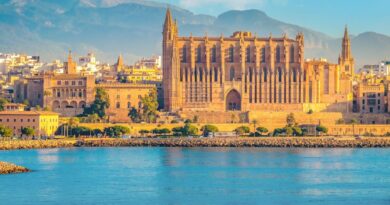LA wildfires: I’m waiting for my house to burn down – nowhere is safe | World | News
It is 2am and I’m writing by flashlight in the dark, acrid smoke hanging in the cold night air, waiting for my home to burn down. I have been without power for more than 30 hours, since ferocious winds lashed Los Angeles sparking the city’s most destructive wildfires in living memory, and the tension is as palpable as the ash that falls like macabre snow.
Almost every hour, I am hearing from yet another friend who has lost a home.
David is an architect who after a bitter divorce spent two years crafting a beautiful new ocean view home in Pacific Palisades. Gone.
“My entire neighbourhood was burned to the ground,” he said. More than a hundred homes overlooking the Pacific. Gone.
Shannon spent four years building her £16million dream home from the ground up in Pacific Palisades. Gone, along with hundreds of her neighbours’ homes. She and her children barely had time to leap into their car to escape the flames. All their possessions: gone.
Lisa, aged 60, who found love five years ago, built a new life with her partner in the Altadena hills overlooking downtown Los Angeles in an idyllic rustic home. Gone.
Jaime’s mother’s home. Diane’s beachfront home. Dawn’s hillside home. All gone.
The skies are bruised black from the Altadena fire in the East to the Palisades fire in the West, and burning embers blowing for miles are spreading spot fires randomly across the city. Nowhere is safe.
Everyone knows someone who has lost a home, and knows they could be next.
Hours ago, as my daughter Natasha frantically fled when yet another wildfire rampaged through Runyon Canyon in Hollywood towards her home, it suddenly looked like it was my turn to stare into the abyss, as a new blaze erupted barely a mile from my doorstep.
I watched anxiously as firefighting helicopters dropped water and flame retardant, and friends seeing the newly christened Sunswept fire unfold on live television phoned to offer a blow-by-blow account as a four-storey house collapsed in minutes, and flames leapt into the drought-dried brush, spreading rapidly.
My wife and I quickly began loading the car with what we dared salvage from our home: a few clothes; family photographs; passports and the deed to our house; computers; and our confused little dog, Roxy.
The night sky glowed red, and all down our street neighbours fumbled and laboured to load a distillation of their own worldly goods into their vehicles. If the blaze wrapped its arms around the hillside, our house would be gone in minutes. But for once the winds were kind, barely a breeze. Firefighters wrestled the Sunswept fire to its knees. And after a tense 90 minutes, we all began to unload our cars, returning to our homes for a sleepless night.
The city is in shock, and it is too soon to say if Los Angeles mayor Karen Bass will be eviscerated by residents for being overseas in Ghana when her town went up in smoke, or whether recent cuts to firefighting budgets will cause a political firestorm when the ashes settle. For the moment, we watch and wait. Strong winds were expected to return on Thursday, bringing the threat of newly downed power lines, fresh wildfires, and continued destruction.
Los Angeles will recover, eventually. But residents’ peace of mind? Gone.




